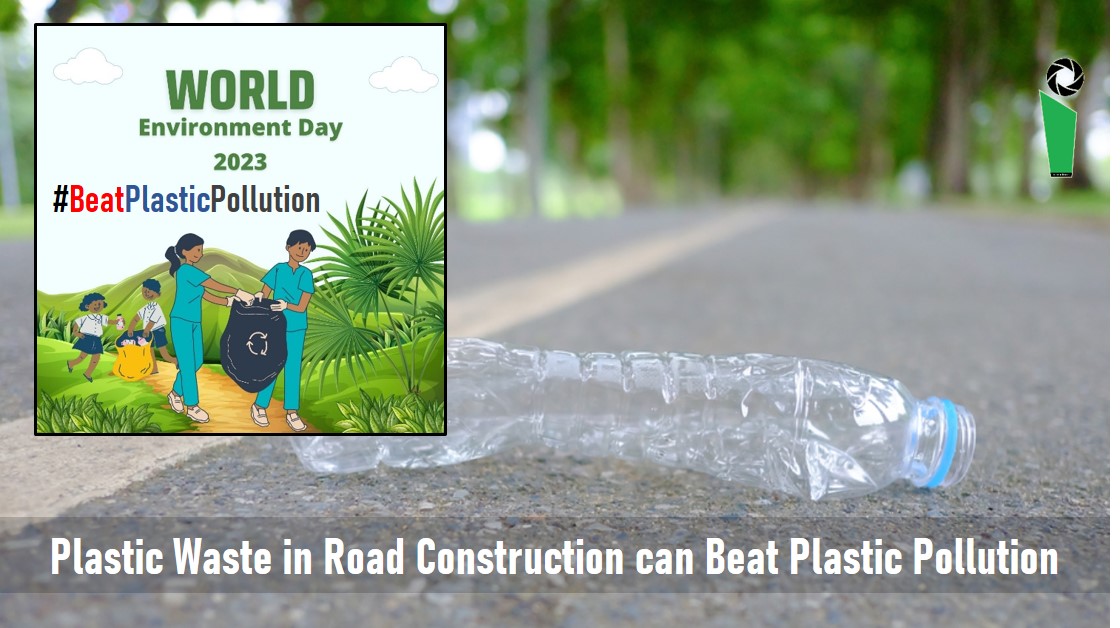The World Environment Day is observed on June 5 every year. The day urges all of us to protect our natural surroundings and encourages worldwide activism. The theme for World Environment Day on this year focuses on solutions to plastic pollution under the campaign #BeatPlasticPollution. And, to beat plastic pollution one of the best solutions which has been explored out in recent times, is the use of plastic waste in road construction after recycling.
This year also marks the 50th anniversary of World Environment Day, after it was established by the United Nations General Assembly in 1972. Over the past five decades, the day has grown to be one of the largest global platforms for environmental outreach. Tens of millions of people participate online and through in-person activities, events and actions around the world.
Plastic Pollution
The world is being inundated by plastic, as more than 400 million tons of plastic is produced every year. We live in a consumer-driven, throwaway society; more than half the plastic ever produced has been in the last 15 years. Nearly half the plastic produced is used just once and thrown away. This “single-use plastic” impacts our rivers, land, and finally then oceans. Every year 8 million tons of plastic ends up in the oceans. As a non-biodegradable material, it breaks down into smaller particles (micro-plastics), which are eaten by small marine organisms, entering the food chain.
Today, plastic clogs our landfills, leaches into the ocean and is combusted into toxic smoke, making it one of the gravest threats to the planet. Not only that, what is less known is that microplastics find their way into the food we eat, the water we drink and even the air we breathe. Many plastic products contain hazardous additives, which may pose a threat to our health. However, the good news is that we have science and solutions to tackle the problem –and a lot is already happening.
“Plastic Waste in Road Construction”
A report of the World Bank, “Plastic Waste in Road Construction: A Path Worth Paving?” says the upcoming international, legally binding treaty to reduce plastic pollution calls for a full life cycle approach to reduce plastic pollution, incorporating both upstream and downstream measures. The use of plastic waste in road construction is a downstream measure to utilise plastic waste as an input material and further upstream measures to reduce plastic waste are needed, the report says.
The use of plastic waste in road construction is a viable option for the application of plastic waste that also protects environmental and human health. Treating the waste as a bitumen modifier in roads, referred to here as plastic roads, has emerged as an innovation which uses plastic waste as an input material.
Successful Plastic Road Experiments
Notwithstanding, the World Bank report identifies 132 total plastic roads project worldwide. However, it is significant to mention, Pakistan has also constructed recently its first plastic road in Islamabad. The Capital Development Authority`s member of engineering reportedly told told that over a kilometre plastic road had been recently constructed from Ayub Chowk to Margalla in collaboration with a private company. The report estimates that 58% of plastic roads projects surveyed were in planning, pilot, or construction phases while 37% were already constructed and in use. The report has found that many companies are starting to implement or pilot this technology worldwide
#BeatPlasticPollution
The World Bank report mentions that plastic roads are an emerging technology. It also provide an overview on the use of plastic waste in road construction using the dry process, in comparison to conventional roads. Given the large amounts of plastic waste produced globally, entrepreneurs, innovators and researchers are discovering new ways of utilising plastic waste. The dry process primarily faces quality control issues, such as uneven distribution of plastic waste within the asphalt mix. This results in operational issues for the industry and constraints in mainstreaming the technology.
Indeed, the World Environment Day 2023 is a reminder that people’s actions on plastic pollution matters. It is time to accelerate this action and transition to a circular economy. It is time to #BeatPlasticPollution.
By
Editorial, Infocus



